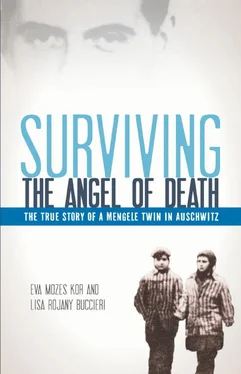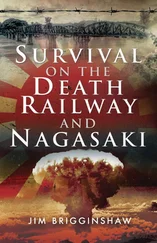Just before roll call actually began, the air raid sirens sounded a loud, piercing warning: We were going to be bombed. With shivering delight I watched the SS guards run for cover as a plane with an American flag painted on one of the wings circled the concentration camp. I thought to myself, “Look at these Nazis, the bullies of the world, running like scaredy cats!” I recognized the Stars and Stripes because our aunt, Papa’s sister, lived in Cleveland, Ohio, and before the war she had sent letters to us with stamps printed with the American flag. Now the plane flew low and made a yellow smoke circle above the entire camp. Even in those days, we knew that the plane would not bomb inside the circle. More planes followed, and in the distance we heard bombs exploding. The American planes gave us hope. The planes meant that help was coming. Someday soon we would be freed and get to go home—if we could just stay alive long enough. We kids clapped; those were our moments of glory.
But on our next visit to the lab, the doctors did not bother to examine me. They called my number and took my temperature. I knew I was in trouble. Immediately two pflegerin put me in some kind of car or Jeep and drove me away. I did not even get to see Miriam before I was taken away. It was the first time in the camp that we had been separated. Staying together, counting on each other, having another human being to really care about had kept us both from feeling so alone.
The nurses took me to the infirmary: Building #21, a filthy barracks close to the gas chamber and flaming chimneys. A putrid stench filled the air. Bunks three tiers high held people who were half dead. Row After row, they formed a sea of human beings dying a slow death. All of them were grown-ups. As I walked past, they reached out their bony fingers:
“Please!”
“Water! Water!”
“Food! Please! Anything?”
“Help me!”
They all seemed to be crying, unable to move. It looked like there were more hands reaching out than there could have been people. I can recall reading about a Valley of Death in the Bible; the infirmary felt like that valley. It was the worst place I had ever been.
I was put into a room with two older girls, Vera and Tamara. Each of the girls was the sister of another pair of twins. They had chicken pox, so they were not too sick. Our room was small, but only we three shared it—another privilege for twins.
That night the time for dinner came and went. We received no food ration.
“Why aren’t they feeding us?” I asked. “We should be getting bread.”
Vera said, “No one here gets anything to eat because people are brought here to die or are taken from here to die in the gas chamber.”
“They don’t want to waste food on the dying,” said Tamara.
I cannot die, I told myself.
I will not die.
That night I was too sick to feel hungry. I found it hard to sleep without Miriam beside me, cuddling. In the dark I heard people moaning and screaming in pain. Th eir screams cut into me. I had never heard so many voices wailing, howling, and bellowing.
The next day a truck came. The sickest people were thrown onto the truck bed to be taken directly to the gas chamber. They shrieked and struggled as some of them were tossed on top of people who were already dead.
“Am I going to the gas chamber?” I thought. The gas chamber was always there, next to the crematorium belching its stink of burning human hair, bones, and flesh into the air all around us. The gas chamber was a real possibility for any of us in that camp—but more so for those of us in the infirmary. Twice a week those trucks would come. Years later, I learned that right before the bodies were thrown into the crematorium, a group of workers would pull out gold teeth and remove any jewelry. The Nazis collected an average of seventy-six pounds of gold from the bodies every single day. Someone was getting rich.
The morning after I arrived, Mengele and a team of four other doctors came to see me. They discussed my case as though they were in a regular hospital. Although they spoke in German, I understood a lot of what they were saying. Dr. Mengele laughed and said about me with a smirk, “Too bad. She is so young and has only two weeks to live.”
“How could he know that?” I wondered. They had not run any more tests on me after the poisonous shot. I’ve since learned that Mengele knew what disease they had infected me with and how it would progress. It might have been beriberi or spotted fever. In all the years since, I have never found out for sure.
As I lay in the bed and listened to Mengele and the other doctors, I tried not to let on that I grasped the meaning of their words. I said to myself, “I am not dead. I refuse to die. I am going to outsmart those doctors, prove Dr. Mengele wrong, and get out of here alive.” Above all, I knew I had to get back to Miriam.
During those first few days, I was running a very high fever, but no one gave me food, medicine, or water. They only checked my temperature. I was so thirsty, desperate for water, my mouth so dry I thought I could not breathe much longer.
There was a faucet at the far end of the barracks. I remember sliding out of bed, opening the door, and crawling on the floor to reach that faucet. The rough cement scraped my skin, chilling my belly. I stretched my hands forward and dragged my body on all fours, creeping slowly along that floor coated with muck and slime. Sometimes I passed out, then woke up and inched onward.
I am going to get well, I kept repeating to myself.
I must live. I must survive.
The need to get water overpowered me. The strangest thing is that I do not remember drinking the water. I must have, because there was no other way I could have survived. I do not even recall how I got back to my bunk in the room I shared with the other girls. Yet every night for two weeks I pulled myself to that faucet.
After my first week in the infirmary, Miriam found out that I was not receiving any food. Mrs. Csengeri, our old friend, told her. Mrs. Csengeri acted as a messenger, sneaking from barracks to barracks as she visited her own twin daughters. Miriam started saving her bread for me and gave it to Mrs. Csengeri to deliver into my hands. Imagine Miriam’s willpower, a ten-year-old deciding not to eat for a week! That daily piece of bread from my twin sister helped save my life and made me more determined to be reunited with her.
After two weeks, like a miracle, my fever broke! I started feeling stronger. One night I woke up and saw the silhouette of our block supervisor: slim, dark. Every once in a while she stole into our room at night and gave us food. “Here is a piece of bread for you,” she said quietly, putting it on my bed. “If anybody finds out, I’ll be punished.” Once she even gave Vera, Tamara, and me a piece of her birthday cake. What a treat! It was so good, so sweet. We devoured it, licking our fingers and then licking the paper that had held the cake. Even in Auschwitz some people were humane.
However, when I think back on those days, I am not sure why she did not give me water when I was so sick the first two weeks. I can only guess that she saved her efforts for those who looked as though they would survive.
As I gained strength I wanted to get out of that infirmary as fast as I could, but I was still running a fever. Dr. Mengele and his team came twice a day to check my fever chart. I had to convince them that my temperature was going down so that I could be sent back to the twins’ barracks. So I thought of a plan.
Vera and Tamara taught me how to read the thermometer. When the nurse, a fellow prisoner, came in and placed the thermometer under my arm she told me to keep it there until she returned. After she left the room, I took the thermometer out, read it, and shook it down a little. Then I put it back in my armpit almost all the way, letting it stick out the back so that it would not register any change. The nurse returned, read my temperature, and wrote it down. I had to be very careful to do this gradually so that Mengele would not get suspicious about my recovery. The plan worked! Th ree weeks later I was released.
Читать дальше












